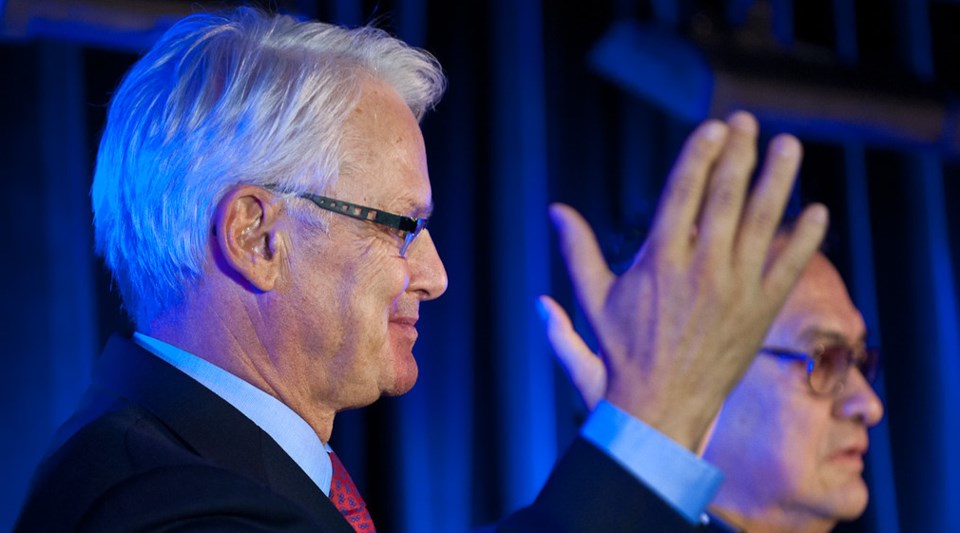B.C.'s centre-right movement is urging former premier Gordon Campbell to help broker a deal between the upstart provincial Conservatives and the flagging BC United parties, as the prospect of a vote-split and enormous BC NDP re-election victory looms large over this fall’s provincial election.
Campbell is being asked to intervene and mediate talks between Conservative and United officials, as part of an intervention by the province’s business community, as well as by those in and around the United party who see catastrophe on the horizon under the current trajectory.
Both Conservative Leader John Rustad and United Leader Kevin Falcon served as cabinet ministers in BC Liberal governments when Campbell was premier from 2001-11. Falcon considers Campbell a personal friend and mentor.
Conservative and United officials are waiting to hear if the former premier will agree to facilitate discussions. His participation is not at all assured, but on a short list of names of political heavyweights with the influence to inch the leaders to a solution.
The move comes as Falcon and Rustad spoke more openly about possible co-operation during duelling press conferences at the legislature Tuesday.
“I think it behoves us to make sure that we're doing everything we can to try and defeat that government,” said Falcon.
“We've got emissaries from both parties that are having discussions to see if we can find common ground, recognizing that the real enemy is the NDP government, and four more years of that government, I think will be frankly economically devastating for the province of British Columbia.
“That's why we have to put aside our own egos, our own party issues, everything else, and just figure out whether there's common ground that can keep in mind what the most important goal is, and that is making sure we don't end up with another NDP government.”
Rustad said there are limited opportunities for co-operation now that his party has more than 62 candidates in place. He said BC United should have agreed to talks before Christmas, and blamed the party for brushing him off at the time.
“There has been conversations that have been going on between various business groups with regards to what a potential could be between the United party and the Conservative party,” said Rustad.
“But I can tell you, we will not compromise our principles. We will not compromise what we have been building as a party. People are tired of 33 years – it's been 16 years of BC Liberal and 17 years of NDP – they're looking for something different. And that's what we are going to deliver for people in the province.”
A new poll from Abacus Data on Tuesday put BC Conservative support at 34 per cent, up eight points from November, and within striking distance of the NDP at 40 per cent. BC United sat at 13 per cent support in the poll, down four points from November.
Several other polls recently have reported similar results. They indicate the combined popularity of the United and Conservative parties could be enough to unseat the governing BC NDP. Apart, the two parties risk splitting the centre-right vote, paving the way for an NDP supermajority.
Still, any merger talks between the two parties run into immediate logistical hurdles.
Who would be the leader of a new, combined party?
Falcon and Rustad personally dislike each other after Falcon fired Rustad from the United caucus in 2022 over Rustad’s views on climate change.
Falcon has the most MLAs, but is less popular in the polls. Rustad has less support in the business community, but more widespread public support.
BC United has better fundraising and organizational capacity. Conservatives have the better name, with a linkage to Pierre Poilievre’s surging Conservative Party of Canada (though there is no official relationship between the two parties).
Neither party leader has indicated a willingness to quit to make a deal happen, though Falcon’s language on Tuesday was the closest yet to opening that door.
“Everyone should know this about me, I came back to do this not because I wanted a job or I needed to be back in public life, but because I was concerned about my kids’ generation,” he said.
“That's what's motivated me to come back into public life. And what I care about is putting the interests of the province well ahead of my own interests. I will always do the right thing for free enterprise and for the province of British Columbia.”
It’s also unclear how the parties could merge when, under such a scenario, either incumbent BC United MLAs would have to agree to resign in key ridings, or already-appointed Conservative candidates (technically, leading in the polls) would have to agree to withdraw.
Others have proposed exploring some sort of non-compete clause between the two parties in key provincial ridings, followed by a coalition-type government should the two parties hold the balance of power after an election. But the idea is at this point nothing more than wishful thinking.
Most in and around the parties believe it’s too late to cut any type of deal between United and the Conservatives, even if Campbell comes to the table.
In that case, the most realistic merger for the centre-right will be the one that emerges from the rubble of the Oct. 19 provincial election.
Rob Shaw has spent more than 16 years covering B.C. politics, now reporting for CHEK News and writing for Glacier Media. He is the co-author of the national bestselling book A Matter of Confidence, host of the weekly podcast Political Capital, and a regular guest on CBC Radio.



